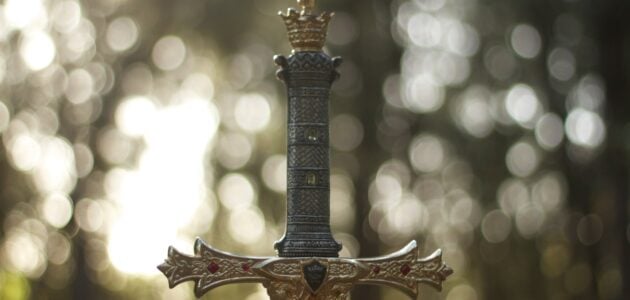
Bolingbroke Monologue (Act 2, Scene 3)
Today we’re going to be breaking down a much lesser known and severely underrated speech by Bolingbroke from Richard the Second Act 2, Scene 3. There are those who say that there is no subtext in Shakespeare. And I am once again politely disagreeing with them and pointing to yet another brilliant Shakespeare monologue absolutely riddled with the stuff. This monologue is high stakes, packed to the rafters with emotion, brilliantly written and complex. Let’s take a look…
Context
Meet Henry Bolingbroke, who will later become King Henry VI of England, succeeding his cousin, Richard the II, the current King. But more on that later. At the start of the play Bolingbroke has accused Mowbray of treason, and of murdering his uncle. Mowbray denies the accusations and King Richard decides they will settle the matter in a duel. John of Gaunt, Bolingbroke’s father, believes it was Richard who ordered the death of his brother, and King Richard’s wife reveals that to be true in the next scene, but John is too loyal to the crown to take action.
Just as the duel is about to start Richard banishes both Mowbray and Bolingbroke, but upon seeing John of Gaunt’s reaction, reduces Bolingbroke’s sentence to just six years.
Fast forward and John of Gaunt has turned ill and died whilst his son Bolingbroke is still banished. Immediately afterwards Richard seizes all of his land and money, planning to use it to fund a war with Ireland.
This angers a lot of people, but not York, Bolingbroke’s Uncle, who still remains loyal to the King. Those who are angry with Richard help Bolingbroke to return to England to overthrow Richard.
When Richard leaves to invade Ireland Bolingbroke invades the north coast of England but he is met by his Uncle, the Duke of York who accuses him of treason. Bolingbroke responds…
Original Text
As I was banished, I was banished Hereford;
But as I come, I come for Lancaster.
And noble uncle, I beseech your grace,
Look on my wrongs with an indifferent eye.
You are my father, for methinks in you
I see old Gaunt alive. O then, my father,
Will you permit that I shall stand condemned
A wandering vagabond, my rights and royalties
Plucked from my arms perforce and given away
To upstart unthrifts? Wherefore was I born?
If that my cousin king be King in England,
It must be granted I am Duke of Lancaster.
You have a son, Aumerle, my noble cousin.
Had you first died and he been thus trod down,
He should have found his uncle Gaunt a father
To rouse his wrongs and chase them to the bay.
I am denied to sue my livery here,
And yet my letters patents give me leave.
My father’s goods are all distrained and sold,
And these, and all, are all amiss employed.
What would you have me do? I am a subject,
And I challenge law . Attorneys are denied me,
And therefore personally I lay my claim
To my inheritance of free descent.
Unfamiliar Language
Beseech: Ask
Indifferent: Impartial
Condemned: Judged
Vagabond: Someone without a home
Perforce: By force
Upstart: Risen suddenly in rank
Unthrifts: Spendthrift/Bad with money
Wherefore: Why
Thus: This way
Trod: Stepped upon
Sue: Wear
Livery: Family colours
Letters–Patents: Legal rights
Distrain’d: Liquidated
Amiss employed: Put to ill ends
Modern Translation
When I was banished, I was banished with the name Hereford;
But now I return as a Lancaster.
And noble Uncle, I beg you now,
Look at the things I’ve done without judgement.
You are like a father to me, because when I look at you
It’s like I’m looking at Old John of Gaunt in the flesh.
Oh, my Father will you allow me to stand here condemned with everything that
Is rightfully mine stripped away from me by force and handed to some spendthrift ambitious folks?
Why was I born? If my cousin is the King, then I must be the Duke of Lancaster.
You have a son, Aumerle, my noble cousin.
If you’d died first and he had been treated like me,
He would have found a father in John of Gaunt,
Who would help him fix his mistakes and chase his troubles away.
I am not allowed to wear my family colours here.
Even though I have legal right to do so,
Everything my father had has been liquidated and sold,
And everything has been put to ill use.
What do you want from me? I am a citizen and I am challenging the law of the land.
And therefore, I have come to claim my inheritance in person.
Notes on Performance
Keep in mind exactly what’s at stake if this goes wrong. Both of these men stand here speaking to each other with their own armies right behind them ready to fight. This is what it means to be aware of the given circumstances. Hundreds of lives are at stake so keep that in mind.
The second thing to think about is that you want to be trying to affect whoever it is you’re speaking to, which in this instance is the Duke of York. You need to convince that character not to demolish you on the spot with the entirety of the Royal English Army behind him and to allow you to come home to challenge the King’s ruling. So chase that objective.
Lastly, as mentioned before, keep in mind that underlying this whole speech about just coming home to claim his inheritance is the plan to overthrow the King. Bolingbroke isn’t necessarily lying per se but he is withholding the truth of his true intentions. This is subtext and you should keep this in mind during her rehearsal and performance of this speech.

Leave a Reply